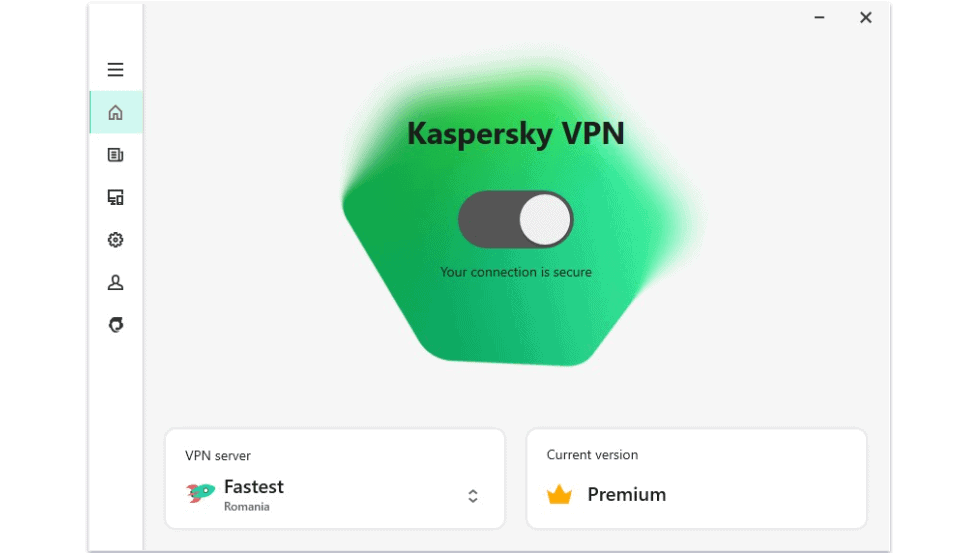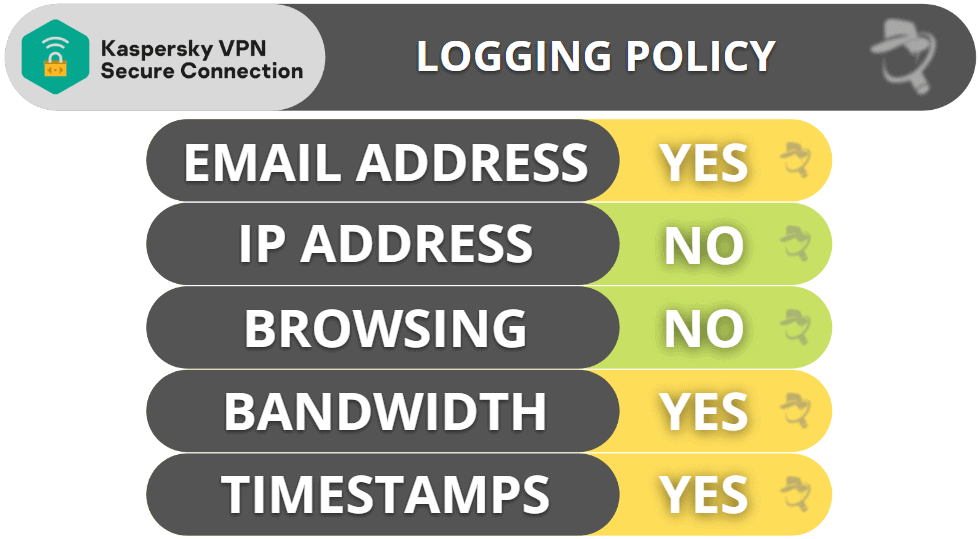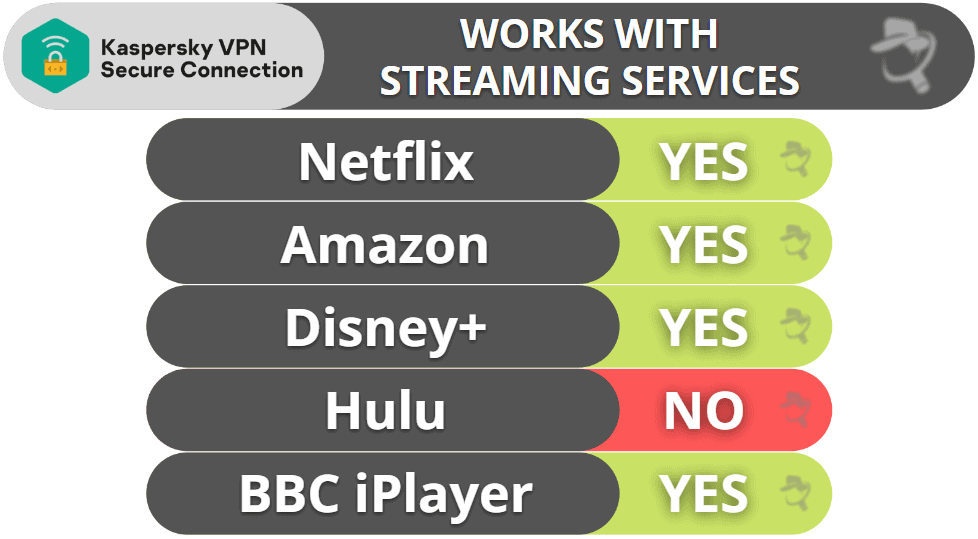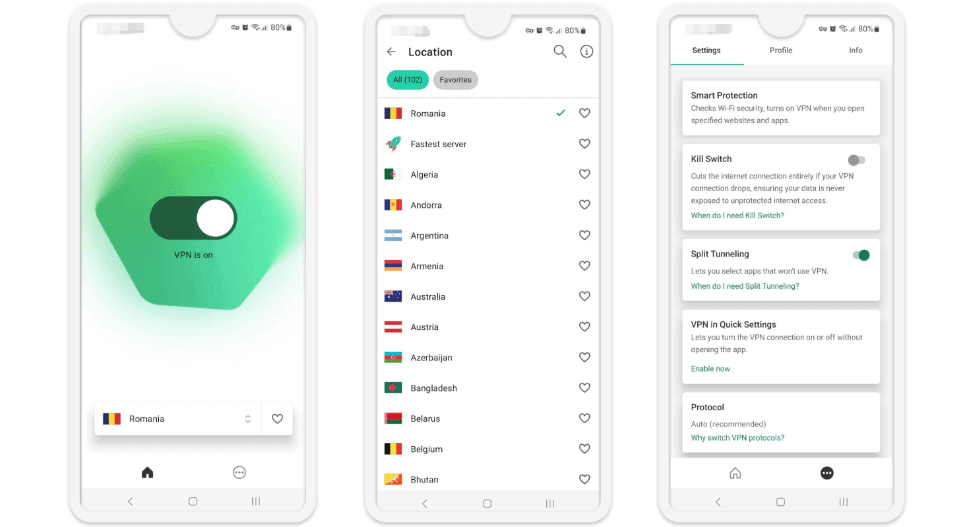Kaspersky VPN Review: Quick Expert Summary
Kaspersky VPN provides good security features, fast speeds, and very affordable plans, but I think there are much better VPNs out there.
Kaspersky VPN comes with industry-standard security features like 256-bit AES encryption, a kill switch, a no-logs policy, and full leak protection. It also includes advanced security features like perfect forward secrecy, as well as double VPN connections and split-tunneling.
In my speed tests, Kaspersky VPN performed really well — I enjoyed fast browsing and downloads on both local and distant servers. I also like that Kaspersky VPN allows torrenting on all of its servers and works with popular streaming sites like Amazon Prime, Disney+, and BBC iPlayer.
While Kaspersky VPN is a good service, it has many drawbacks I can’t ignore. It’s based in a restrictive country (Russia), it’s missing extra features like an ad blocker, its customer support is awful, and it’s not available for purchase in the US (the US government has banned the sale of all Kaspersky products).
Kaspersky VPN allows 5–10 simultaneous connections and has very cheap paid plans. It also offers a limited free plan and comes with a 30-day money-back guarantee. The paid plans are available as a standalone purchase, or as part of the Kaspersky Plus and Premium subscriptions, which include access to Kaspersky’s antivirus program (Kaspersky is one of the top antiviruses in 2025), a password manager, anti-phishing protection, a data leak checker, and more.
Overall, Kaspersky VPN doesn’t provide as much value as top VPNs like ExpressVPN, but it’s still a very fast and secure VPN for web browsing, torrenting, and streaming.
| 🏅 Overall Rank | #39 out of 82 VPNs |
| 🌍 Number of Servers | 2,000+ |
| 📱 Number of Devices | 5–10 |
| 💸 Starting Price | $2.83 / month |
| 🎁 Free Plan | ❌ |
| 💰 Money-Back Guarantee | 30 Days |
Kaspersky VPN Secure Connection Full Review — Very Cheap, but It Lacks Extras & Has Poor Customer Support

Kaspersky VPN is one of the cheapest VPNs out there, so I think it’s a good pick if you’re on a budget. It also comes with essential VPN security features, is very fast, and is pretty good for torrenting and streaming.
But unlike top VPNs such as ExpressVPN and Private Internet Access, Kaspersky VPN doesn’t have many extra features, isn’t located in a privacy-friendly country, and doesn’t provide good customer support.
Overall, Kaspersky VPN is a decent VPN that does many things well, but it’s not as good as the best VPNs on the market.
Kaspersky VPN Secure Connection Plans & Pricing — Very Affordable, but It Can’t Be Purchased in the US
Kaspersky VPN has a free plan and paid monthly and yearly plans. It allows up to 5–10 simultaneous connections (the industry average is 5–10 connections).
Kaspersky VPN’s free plan has fast speeds, but it lacks a kill switch and split-tunneling, and it limits you to 200 MB per day, which is only enough for 1-2 hours of basic web browsing. I think there are much better free VPNs out there — Proton VPN’s free plan is my favorite because it comes with unlimited data and strong security.
Kaspersky VPN’s paid plans, which start at $2.83 / month, are very affordable. The provider has one of the cheapest monthly plans out there, and its yearly plan is very competitive with other low-cost VPNs like Private Internet Access and CyberGhost VPN, but these standalone VPNs provide better value than Kaspersky VPN.
The paid VPN is also bundled with Kaspersky’s other subscriptions — Kaspersky Plus ($33.18 / year), which includes access to Kaspersky’s antivirus (one of the best antivirus programs on the market), and Kaspersky Premium ($34.41 / year), which adds free access for 1 year to Kaspersky Safe Kids, a great parental control app.
Kaspersky VPN accepts major credit cards and PayPal and backs all purchases with a 30-day money-back guarantee.
Kaspersky can’t currently be purchased from the US due to the government ban.
Kaspersky VPN Secure Connection Features — All the Essentials (But Little More)
Kaspersky VPN provides the following industry-standard VPN security features:
- 256-bit AES encryption. Kaspersky VPN uses bank-grade encryption to make your traffic unreadable.
- No-logs policy. Kaspersky VPN has a strict no-logs policy, meaning it doesn’t record your IP address and online traffic.
- Kill switch. This feature disables your internet access if the VPN connection drops to prevent traffic leaks.
Kaspersky VPN uses WireGuard, a lightweight and open-source protocol, and the Catapult Hydra protocol, both of which are very secure and provide really fast speeds. In my tests, my speed with both protocols dropped by around 20%, which is on par with some of the top VPNs on the market.
I like that Kaspersky VPN includes advanced security features like perfect forward secrecy — it changes your encryption key for each VPN session to prevent hackers from compromising past or future encryption keys to spy on your traffic.
Kaspersky VPN comes with full leak protection against IPv6, DNS, and WebRTC leaks on all of its apps. I ran multiple leak tests on servers in 20+ countries and thankfully never saw any leaks.
I also like the Smart Protection feature, which lets you personalize your VPN connection preferences. For example, you can make Kaspersky VPN automatically connect to a VPN server when it detects that you’re connecting to an unsecured public Wi-Fi network. On Android, you can further customize it by adding apps and website categories to the mix — for example, Kaspersky VPN could auto-connect you to a server when you visit banking sites, online stores, social networks, and specific apps from your device.
Kaspersky VPN allows double VPN connections on desktop, too, which sends your data through 2 servers instead of just 1. Kaspersky supports double VPN connections in all 80+ countries and lets you choose the entry and exit server’s location — Surfshark is one of the only top VPNs that has a similar double VPN feature (it also has servers in more countries, which means more options).
You also get split-tunneling, a feature that lets you decide which apps on your device are routed through the VPN tunnel and which apps use your regular connections. This is super useful if you only need the VPN for a couple of apps or if you have apps that require your location (like delivery apps) or apps that ban VPNs (like most bank apps).
However, I don’t like that Kaspersky VPN lacks additional features like other top VPN providers — for example, ExpressVPN has a built-in password manager on mobile and an ad, tracker, and malicious site blocker.
Overall, Kaspersky VPN doesn’t have many extra features, but it includes essential VPN security features and convenient automation options.
Kaspersky VPN Secure Connection Privacy & Security — Strict No-Logs Policy, but It’s Headquartered in Russia
Kaspersky VPN has a strict no-logs policy — it doesn’t log your internet traffic and your IP address, and the only information it requests is your email address (for account creation and communication).
But I’d like to see Kaspersky VPN’s no-logs policy undergo an independent audit (like ExpressVPN and Private Internet Access) to prove it doesn’t store user data.

But I like that Kaspersky VPN provides transparency by running a vulnerability management and disclosure program, which includes a bug bounty program. These programs allow independent researchers to report any vulnerabilities with Kaspersky’s apps. Kasperksy’s team then looks into the potential vulnerabilities and informs users about any updates in response to these reports. So far, Kaspersky has addressed a couple of minor security flaws in the Kaspersky VPN app.
Kaspersky VPN is headquartered in Russia. While that’s outside the jurisdiction of the 5/9/14 Eyes Alliances (a group of countries that share surveillance data with each other), Russia isn’t a privacy-friendly country — it censors some sites on the internet and requests user data from companies. And even though Kaspersky VPN is transparent about how it deals with user data requests, it also says it might share user data with government authorities if necessary.
Overall, Kaspersky VPN has a strict no-logs policy and a transparent vulnerability management and disclosure program. But, I don’t like how it’s headquartered in a restrictive country (Russia) and that it might share user data with government authorities.
Kaspersky VPN Secure Connection Speed & Performance — Fast on Local & Distant Servers
I tested Kaspersky VPN’s speeds on a server in all 80+ countries where it has servers using my Windows 11 PC. I had the fastest speeds while connected to a local server in my country (Romania), but I also maintained fast speeds for torrenting and watching videos on distant servers in the US, Vietnam, Canada, and Singapore.
I first tested my local network’s speeds without being connected to the VPN. Here are my results:

Next, I used Kaspersky VPN’s quick-connect feature (called Fastest), which connected me to a local server in Romania.
Finally, I ran a speed test while connected to a distant server in the US:

Overall, Kaspersky VPN provided me with fast speeds on both local and distant servers. On nearby servers in Romania, I experienced a 60% slowdown — but Romania has very fast internet speeds, so websites still instantly loaded, HD videos started right away and didn’t buffer, and I played online games without experiencing lag or high ping. When I connected to a distant server in the US, I experienced a 65% slowdown — I noticed some minor delays, but my connections were still fast. Websites loaded in 3–4 seconds, HD videos immediately loaded but there was a little bit of buffering when I skipped through them, and I downloaded 14 GB files in 8 minutes (which is very fast).
Kaspersky VPN Secure Connection Servers & IP Addresses — Large Network (Servers in 80+ Countries)
Kaspersky VPN has 2,000+ servers in 80+ countries — it provides a large server network, so almost all users will be able to connect to a nearby server to get fast speeds. While other top VPNs have bigger server networks (ExpressVPN and CyberGhost VPN both have servers in 100+ countries), Kaspersky VPN still has more servers than other top competitors like PrivateVPN (200+ servers in 63 countries) and VyprVPN (700+ servers in 70+ countries).
I really like that Kaspersky VPN allows torrenting on all of its servers — other competitors only allow P2P traffic on dedicated servers, so it’s harder to find a nearby server to get fast downloads (for example, CactusVPN has P2P servers in only 5+ countries).
But I wish Kaspersky VPN would display server metrics, including the server load (how many active users are connected to a VPN server) like Proton VPN or server ping (how long it takes an internet signal to travel from your device to the VPN server) like Private Internet Access. Those metrics make it much easier to find fast VPN servers.
Overall, Kaspersky VPN comes with a large server network and allows torrenting on all servers, but it doesn’t display the server ping or load.
Kaspersky VPN Secure Connection Streaming & Torrenting — Good for Both Activities
Kaspersky VPN is good for streaming. It can access Netflix, Amazon Prime, Disney+, and BBC iPlayer, as well as Crunchyroll and Max. However, Kaspersky VPN doesn’t work with Hulu.
If you need an excellent VPN for streaming that consistently works with Hulu and other streaming sites, I recommend ExpressVPN — it claims to work with 100+ streaming apps and provides blazing-fast speeds.

Kaspersky VPN is good for torrenting — it allows P2P traffic on all of its 2,000+ servers and it works with popular torrenting apps like qBittorrent, uTorrent, and Deluge.
That said, there are much better torrenting VPNs out there — ExpressVPN allows P2P traffic on more servers in more countries and Private Internet Access comes with port forwarding (lets you connect to more peers to get faster downloads).
Overall, Kaspersky VPN works with popular streaming sites and all of its servers support torrenting.
Kaspersky VPN Secure Connection Ease of Use: Mobile & Desktop Apps — Very Intuitive & Easy to Navigate

Kaspersky VPN has apps for iOS, Android, Windows, and macOS. If you want a VPN that runs on Linux and smart TVs, I recommend ExpressVPN or Private Internet Access.
The mobile apps are very easy to navigate, and I like that there’s a search field for servers and an option to mark servers as Favorites. On average, it only took me 3–4 seconds to find and connect to different servers. Plus, split-tunneling is available on both Android and iOS.
The desktop apps look different from the mobile apps, but they’re just as easy to use — the design is intuitive, there’s a quick-connect feature, and all settings have helpful explanations.
Overall, Kaspersky VPN has simple mobile and desktop apps that are very easy to install and use.
Note for Android users: The Kaspersky VPN Secure Connection app has been removed from the Google Play Store, but you can still download and update it via alternative app stores, such as Samsung’s Galaxy Store and Huawei AppGallery, or by obtaining the .apk file from Kaspersky’s official website.
Kaspersky VPN Secure Connection Customer Support — Inadequate & Slow

Kaspersky VPN’s customer support is pretty bad. While it has tons of support channels like live chat, phone support, and email support, many support reps aren’t knowledgeable. Also, the availability of support channels differs from country to country.
Kaspersky provides dozens of support materials like setup guides and FAQs — but there are very few VPN-related FAQs (most FAQs are antivirus-related), and while the setup tutorials are informative and easy to read, I wish they included screenshots like ExpressVPN and Private Internet Access.
Kaspersky also offers a paid remote assistance option, where a support agent can install the VPN software on your device and answer your questions remotely. But this feature is pricey — PrivateVPN on the other hand provides the same service at no extra cost.
Kaspersky VPN’s live chat support was unsatisfactory. The representatives couldn’t properly answer even really basic questions, and consequently they escalated my queries to tech support, who took days to respond and sometimes didn’t even address the core issue at all. Their email support was also unresponsive to my follow-up questions, which was really annoying.

I also tested Kaspersky VPN’s email support multiple times, but I never received a reply. There’s also a forum where you can post questions, which is usually active. Despite that, nobody replied to my questions.
In general, Kaspersky VPN could significantly improve its customer support. Even though the setup guides proved to be fairly useful, the FAQs and live chat representatives frequently offered inadequate help, and the email support is slow to respond. All the top providers offer far superior customer service.
Is Kaspersky VPN Secure Connection Secure & Fast in 2025?
Kaspersky VPN comes with good security features, very fast speeds, and super cheap plans. It has bank-grade encryption, a kill switch, full leak protection, a no-logs policy, and advanced security features like perfect forward secrecy. It also maintains very fast speeds on both local and distant servers. And I like that it supports P2P downloads on all of its servers and that it works with popular streaming sites like Netflix, Amazon Prime, and Disney+.
That said, Kaspersky VPN has some issues — it’s based in Russia (which is a restrictive country), it doesn’t have too many extra features except for split-tunneling, and its customer support is really bad.
Kaspersky VPN allows 5–10 simultaneous connections, has a limited free plan, and provides very affordable paid plans — and the paid version is also bundled with Kaspersky Plus and Kaspersky Premium, which also include access to Kaspersky’s antivirus program, a password manager, and more. Kaspersky VPN backs all purchases with a 30-day money-back guarantee.
Frequently Asked Questions
Is Kaspersky VPN free?
Yes, Kaspersky VPN has a free plan, but it’s not that good — it has fast speeds and allows torrenting, but it limits you to 200 MB per day (that’s only enough for a few hours of web browsing), lacks split-tunneling and a kill switch (an essential VPN security feature), and you can’t choose which VPN servers you connect to (you can only use the quick-connect feature).
Is Kaspersky VPN good for torrenting?
Yes, Kaspersky VPN provides good P2P support — it allows torrenting on all 2,000+ of its servers, works with popular P2P apps like uTorrent and Deluge, and provides fast download speeds.
That said, I think there are better torrenting VPNs out there — ExpressVPN allows P2P traffic on more servers in more countries and Private Internet Access supports port forwarding, which lets you get faster download speeds.
Is Kaspersky VPN included in Kaspersky Plus and Kaspersky Premium?
Yes, the paid VPN is included in both the Kaspersky Plus and Kaspersky Premium subscriptions. I think Kaspersky Plus provides the best value for most users, as it includes access to one of the best antivirus programs on the market, whereas Kaspersky Premium is more suitable for parents, as it provides free access for 1 year to Kaspersky Safe Kids, which is a great parental control app.
Is it safe to use Kaspersky VPN?
Yes, Kaspersky VPN includes essential VPN security features like 256-bit AES encryption, a kill switch, and a no-logs policy. In addition, it also comes with advanced security features like perfect forward secrecy.
However, Kaspersky VPN is headquartered in Russia, which is a restrictive country that censors the internet and regularly requests user data from companies. Kaspersky VPN is very transparent about how it deals with user data requests, so it’s easy to trust it, but the provider says it might share user data with government authorities when necessary. I think it’d be easier to trust Kaspersky VPN if its no-logs policy would undergo an independent audit like ExpressVPN.

